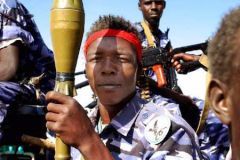Showdown expected in UN over punishment in Darfur
By Evelyn Leopold
UNITED NATIONS, Dec 19 (Reuters) – The United States and the European Union are headed for a showdown in the Security Council next month over prosecuting perpetrators of atrocities in Sudan before the new International Criminal Court, European envoys say.

|
|
Sudanese national troupes. Sudan says it will immediately and unconditionally cease hostilities in its remote Darfur region, and has asked the United Nations and African Union to request that rebel forces do the same. (Reuters). |
To date, all countries, especially the United States, have demanded that those responsible for serious crimes in Sudan’s Darfur region be held accountable.
But unlike European nations, the Bush administration scorns the ICC and is expected to block any Security Council referralto the court, thus leaving the 15-member body few options.
“The crunch is going to come on Sudan,” one senior European council member, who asked not to be named, told reporters.
The United Nations is expected to release a report on violence in Darfur before the end of January that will probably include names of suspected perpetrators. The report would also evaluate whether genocide has taken place in Darfur, Sudan’s western region.
But unless the 15-member Security Council refers the issue to the Hague-based court, there are few alternatives for action, with Russia and China opposing targeted sanctions. A proper trial in Sudan is unlikely and Europeans will oppose an ad hoc court, such as those for the former Yugoslavia and Rwanda, when the ICC was created for that purpose.
“The U.S. has real concerns about the ICC as you know and we have stated that a number of times in the past,” U.S. Ambassador John Danforth told reporters.
“Exactly how that would be adjudicated I don’t know,” he added. British Ambassador Emyr Jones Parry, some diplomats said, was seeking a formula that would let the ICC step in without jeopardizing the U.S. position. Others said the prospect of success appeared unlikely.
The Hague-based court came into existence a year ago as the first permanent global criminal court to try individuals for genocide, war crimes and massive human rights abuses. Some 135 nations have signed and 97 have ratified the statutes establishing the tribunal.
But the Bush administration vigorously opposes the court, arguing that U.S. soldiers could be target of frivolous prosecutions. Congress has enacted legislation that would cut-off economic aid to countries that do not guarantee immunity for U.S. citizens before the court.
China is the only other Security Council member that has not signed or ratified the court’s treaty.
Kenneth Roth, executive director of Human Rights Watch, said that during a visit to Khartoum “smiles vanished” when the ICC was mentioned. “I sensed that serious threat of prosecution at the ICC could help Darfur (and) abusive leaders would be marginalized as they tried to evade arrest,” he said.
Pro-government militia, called Janjaweed, are blamed for killings, rape and pillaging in Darfur. Some 1.8 million villagers have been made homeless in a fight over power and resources.
Khartoum, which denies it armed the Janjaweed, has yet to arrest its leaders as demanded by the Security Council, and blames the disaster in Darfur on armed rebel groups.
Last Tuesday, during a Security Council debate over civilians in war zones, European ambassadors from France, Germany and Britain brought their disagreements into the open.
“The Security Council’s work is considerably limited by this division. It’s a real problem,” said France’s U.N. Ambassador Jean-Marc de la Sabliere.
“When those guilty of massive violations cannot be brought to justice by the concerned state, the international community owes it to itself to act unanimously,” he said.
Said Germany’s Gunter Pleuger, “If we do not end impunity for violations of international humanitarian law … there will be no deterrence for the perpetrator.”
